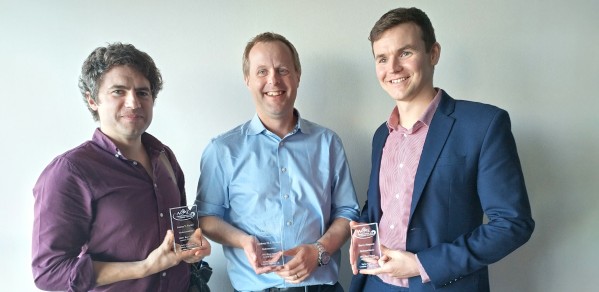
Assistant Professor James Taylor and his co-authors Anthony Dickens and Harry Simpson previously of the Whittle Laboratory and Rolls-Royce won the best paper award for their paper "Compressor Tip Leakage Mechanisms" presented at the 2023 Turbo Expo in Boston, USA.
We are extremely proud of this award, tip leakage flows can be responsible for 1/3 of the inefficiencies within axial compressors and so understanding them is extremely important for gas turbines, aircraft engines, industrial machines and future zero-carbon cycles.
The American Society of Mechanical Engineers (ASME) Turbo Expo Technical Conference is recognised as the world's leading conference on all aspects of gas turbine technologies. The ASME Technical Committees each select a paper to receive their Best Paper Award. This is an opportunity to recognise outstanding technical papers and to acknowledge the authors' contributions to the gas turbine industry.
The research formed the basis of James' Junior Research Fellowship at King's College and a joint project funded by the Aerospace Technology Institute between the Whittle Laboratory and Rolls-Royce.
"We are extremely proud of this award, tip leakage flows can be responsible for 1/3 of the inefficiencies within axial compressors and so understanding them is extremely important for gas turbines, aircraft engines, industrial machines and future zero-carbon cycles."
"These kinds of flow structures are complex, being three-dimensional and turbulent, and as such there are many contradictions and misunderstandings in the field. This paper brings together experiments from rotating test rigs simulating parts of modern compressors and direct numerical simulations of the turbulent structures themselves run on the UK's national supercomputer, Archer2. This kind of calculation has only recently become possible and it is thanks to Professor Andrew Wheeler's solver 3DNS that we are able to do it in Cambridge."
 Image: 1.6 billion cell calculation of the turbulent flow structures created by flow through a compressor tip gap.
Image: 1.6 billion cell calculation of the turbulent flow structures created by flow through a compressor tip gap.
"All of these results point to the fact that there are three different mechanisms that cause losses in efficiency. Some of these mechanisms are well predicted by industry standard simulations and some are not, we think that this could explain a lot of the errors seen in the past."
Now the three mechanisms are simply understood it is possible to use the basic analytic methods and interpretations like we teach in the MEng course at Cambridge. It has opened up the field for a wide range of new designs to successfully improve efficiency, reduce fuel burn and uncertainty around new engines.
"We are honoured to have received this prestigious award. The quality of all the papers presented at this conference was very high. The recognition of technical papers in the various gas turbine disciplines is important for the research community and helps support and maintain the high-quality contributions to the industry."
Taylor, J. V., Dickens, A. M. J., and Simpson, H. (January 16, 2024). "Compressor Tip Leakage Mechanisms." ASME. J. Turbomach. May 2024; 146(5): 051012.

